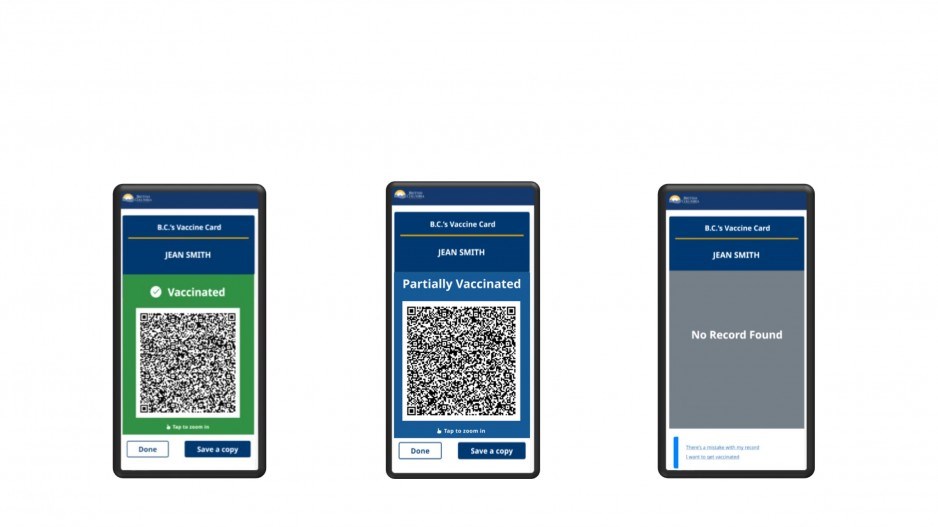Visits to weddings, Canucks games, concerts and more will require government photo ID when the province deploys its B.C. vaccine card next week.
Provincial officials unveiled more details Tuesday about the vaccination certificates ahead of the Sept. 13 rollout, which will see most of the burden fall to private businesses to enforce the new initiate amid the recent surge in COVID-19 cases.
Premier John Horgan said British Columbians responded to by “rolling up their sleeves and we’ve had a 200% increase in the number of people registered for vaccines.”
“But we have seen an unacceptable surge in COVID cases, largely among those who have not yet had the opportunity to be vaccinated.”
He added the vaccine card is not meant to impede essential services.
Vaccinated British Columbians between the ages of 12 and 18 will not have to show government ID when trying to attend what the government describes as discretionary events or businesses.
Beginning Tuesday, West Coast residents can apply for the B.C. vaccine card by visiting and entering their personal health number, date of birth and date of either their first or second COVID-19 vaccine dose.
Users will then be able to save a digital version of the card, which will rely on QR codes to facilitate verification by businesses, on their mobile phones or else print off a paper copy from the website. If an individual does not have access to the internet, they can call 1-833-838-2323 to get a paper copy mailed to them.
Businesses will need to scan the vaccine card’s QR code using a yet-to-be-released app known as the BC Card Vaccine Verifier before allowing patrons inside. Otherwise, workers can also look at the card and verify the user’s name and vaccination details along with the government photo ID.
The app will only confirm a user’s vaccination status: fully vaccinated, partially vaccinated or no records found. No additional health info will be contained in the app or stored in the worker’s mobile device.
“This will be that added layer of protection so that businesses don’t have continuing clusters and outbreaks, and are needed to be closed during this coming fall,” Provincial Health Officer Dr. Bonnie Henry said during Tuesday’s announcement.
From Sept. 13-26, British Columbians can still use the wallet-sized paper cards issued to them when they received their vaccine doses if they wish to enter businesses or events without the digital card or print-out copy of the QR code.
Retail outlets such as grocery and liquor stores, as well as fast-food restaurants, food courts and cafeterias will not be required to verify customers’ vaccination status to grant entry.
And while patios are seen as a safer alternative to dining indoors, proof of vaccination will still apply to those wishing to dine outside at restaurants.
Instructions for businesses will be shared at and the province will also launch an information call line for businesses on Sept. 13.
But the government is urging businesses not to call police as the first resort in the event patrons choose not to show proof of vaccination.
Instead, the province is hoping individuals will be dissuaded by a fine of up to $575, which could be issued by cannabis inspectors, health inspectors, community safety units, gaming investigators and bylaw officers.
Some businesses across the province have already publicly stated they will not enforce the cards. The province, meanwhile, has said those businesses will face fines for violating public health orders.
“If people are making a disturbance, there are provisions for this to be enforced. If businesses are flaunting the rules and putting people at risk, then there’s implications for that as well,” Henry said, adding workers at the affected businesses will not have to show proof of vaccination.
B.C. users will need at least one dose of a COVID-19 vaccine to be permitted entry into discretionary locations as of Sept. 13.
Partially vaccinated patrons will be able to enter those premises for about six weeks by using the vaccine card. But by Oct. 24, users are expected to be fully vaccinated.
“The B.C. government needs to be on standby to get hacked. It's probably going to happen,” David Masson, the director of enterprise security at cyber-defence firm Darktrace PLC, told BIV shortly after plans for the vaccination certificates were announced last month.
The Journal de Montreal reported in late August hackers obtained some QR codes tied to Quebec's vaccine passport campaign, including those belonging to Premier François Legault and Health Minister Christian Dubé.
“The B.C. government is in a difficult position because they're trying to second guess what the future holds. And nobody really knows what the future holds,” Masson said.
The card was designed using the SMART Health Card framework, which Henry described as “internationally recognized criteria for ensuring privacy and security.”
She added that the vaccine card was designed to be interoperable with the federal government’s upcoming vaccination passport, set to roll out in the fall. The federal passport is mean to facilitate international travel rather than to enter private businesses or events.
Travellers from outside B.C. will need to show government ID and officially recognized vaccine records that can be found at .
The vaccine card program is tentatively scheduled to end Jan. 31, 2022, but could be extended beyond that.




